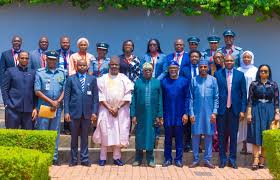· Say National Single Window dead-on-arrival
· Revenue-driven Single Window system contradicts global best practices
By Oluyinka Onigbinde

Stakeholders in the Nigerian maritime industry have described the recently-launched National Single Window (NSW) as dead-on-arrival. This is following the Federal Government’s decision to designate the Federal Inland Revenue Service (FIRS) and the Nigerian Sovereign Investment Authority (NSIA) as the lead implementing agencies.
This move, which has effectively sidelined the Nigerian Shippers’ Council (NSC) and the Nigeria Customs Service (NCS), has sparked widespread outrage and concern, with industry experts warning that it signals the demise of the NSW even before it gets off the ground.
Recall that the Federal Government had previously designated the NSC and NCS as key stakeholders in the implementation of the NSW; a system intended to streamline and automate trade processes across various government agencies. However, the recent decision to replace them with the FIRS and NSIA has raised alarm among key stakeholders who argue that the agencies now in charge lack the necessary expertise in trade facilitation.
In a chat with our correspondent; Mr Babatunde Mukaila, former National Secretary of the Association of Nigerian Licensed Customs Agents (ANLCA), voiced strong opposition to the decision, describing it as a clear indication that the administration under President Bola Ahmed Tinubu is prioritizing revenue generation over trade facilitation. Mukaila criticized the government’s approach, asserting that the NSW’s original purpose of streamlining trade processes has been compromised by the focus on revenue.
“The present administration of Bola Ahmed Tinubu has shown its intent to amass money without regard for trade facilitation. By appointing FIRS as the lead agency for the National Single Window, they’ve effectively killed trade facilitation in Nigeria. This move reveals that the government cares more about money than the efficiency of trade operations,” Mukaila lamented.
He further highlighted the potential chaos that could ensue from this decision, noting that FIRS, primarily a tax agency lacks the expertise to manage trade disputes that are bound to arise from the NSW’s implementation. “Imagine a situation where a shipper has a dispute with FIRS over a bill of lading. It’s absurd to think that a tax agency should have the final say in trade matters. This will only create more bottlenecks and uncertainty in the system,” he added.
Speaking also with our correspondent Dr. Eugene Nweke a maritime expert echoed Mukaila’s concerns, questioning the rationale behind excluding the NSC and NCS, both of which are critical to trade facilitation. Nweke argued that a revenue-driven single window system contradicts the global best practices outlined by the World Trade Organization (WTO) and the United Nations Conference on Trade and Development (UNCTAD).
“The whole idea of the National Single Window is to automate and streamline trade processes, not to create a revenue-generating machinery. If the government’s focus is on revenue, then they’ve completely missed the point. Such a system will never be endorsed by the WTO, because it fails to address the core issues of trade facilitation and non-compliant trade practices,” Nweke noted.
He went on to express disappointment that Nigeria, once a leader in the region’s trade initiatives, is now lagging behind. “Ghana, which took a cue from Nigeria in setting up its National Single Window, is already reaping the benefits. Meanwhile, we are still struggling to get it right. This decision will only make Nigeria a laughing stock among nations,” Nweke lamented.
Otunba Frank Ogunojemite, President of the African Association of Professional Freight Forwarders and Logistics of Nigeria (APFFLON), also voiced his skepticism about neglecting key agencies in the maritime sector. He questioned the wisdom behind placing the FIRS in charge of the NSW, noting that the Single Window System has not been functioning properly even with more relevant agencies involved.
He questioned: “Why would the government think that FIRS, an agency under the Federal Ministry of Finance, is better suited to manage a system designed to facilitate trade?
However, Dr. Segun Musa, Deputy President of the National Association of Government Approved Freight Forwarders (NAGAFF), believes that a neutral agency like FIRS might prevent the system from being compromised.
He said: “The critical stakeholders agreed that Customs should not be made to be the leading agency of single-window. I think the majority will agree that the right decision has been taken by governments that FIRS should be the leading agency to manage the sensitive platform”.
Meanwhile, the Federal Inland Revenue Service (FIRS) had earlier alleged that the nation loses a whopping $4 billion USD annually to bureaucracy and related reasons during the import and export processes.















